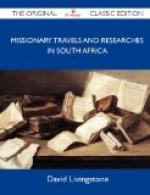Kawawa was not to be balked of his supposed rights by the unceremonious way in which we had left him; for, when we had reached the ford of the Kasai, about ten miles distant, we found that he had sent four of his men, with orders to the ferrymen to refuse us passage. We were here duly informed that we must deliver up all the articles mentioned, and one of our men besides. This demand for one of our number always nettled every heart. The canoes were taken away before our eyes, and we were supposed to be quite helpless without them, at a river a good hundred yards broad, and very deep. Pitsane stood on the bank, gazing with apparent indifference on the stream, and made an accurate observation of where the canoes were hidden among the reeds. The ferrymen casually asked one of my Batoka if they had rivers in his country, and he answered with truth, “No, we have none.” Kawawa’s people then felt sure we could not cross. I thought of swimming when they were gone; but after it was dark, by the unasked loan of one of the hidden canoes, we soon were snug in our bivouac on the southern bank of the Kasai. I left some beads as payment for some meal which had been presented by the ferrymen; and, the canoe having been left on their own side of the river, Pitsane and his companions laughed uproariously at the disgust our enemies would feel, and their perplexity as to who had been our paddler across. They were quite sure that Kawawa would imagine that we had been ferried over by his own people, and would be divining to find out who had done the deed. When ready to depart in the morning, Kawawa’s people appeared on the opposite heights, and could scarcely believe their eyes when they saw us prepared to start away to the south. At last one of them called out, “Ah! ye are bad,” to which Pitsane and his companions retorted, “Ah! ye are good, and we thank you for the loan of your canoe.” We were careful to explain the whole of the circumstances to Katema and the other chiefs, and they all agreed that we were perfectly justifiable under the circumstances, and that Matiamvo would approve our conduct. When any thing that might bear an unfavorable construction happens among themselves, they send explanations to each other. The mere fact of doing so prevents them from losing their character, for there is public opinion even among them.




